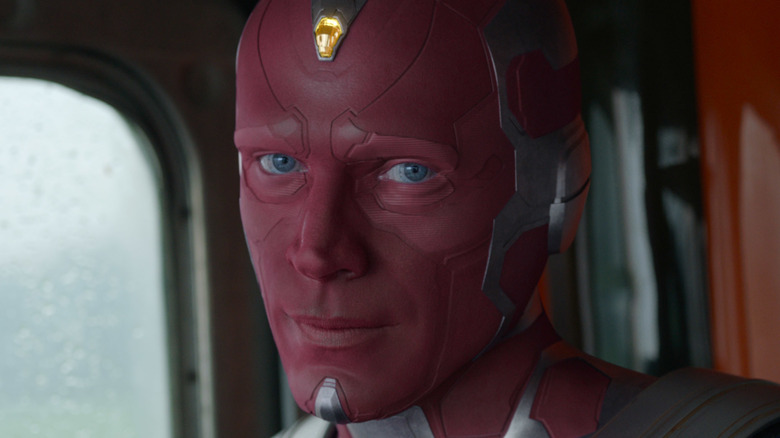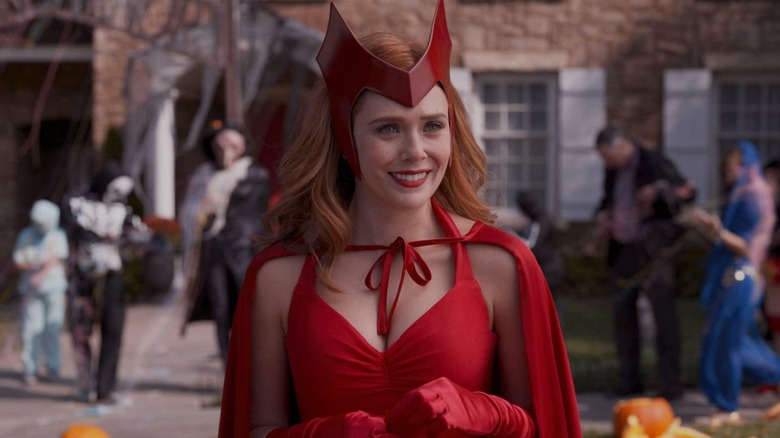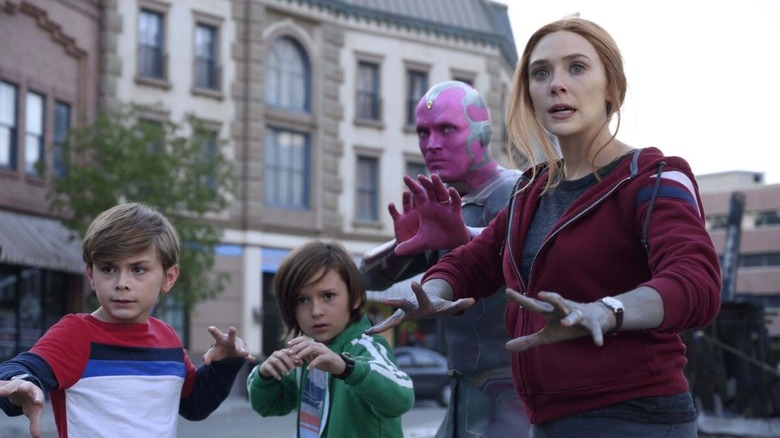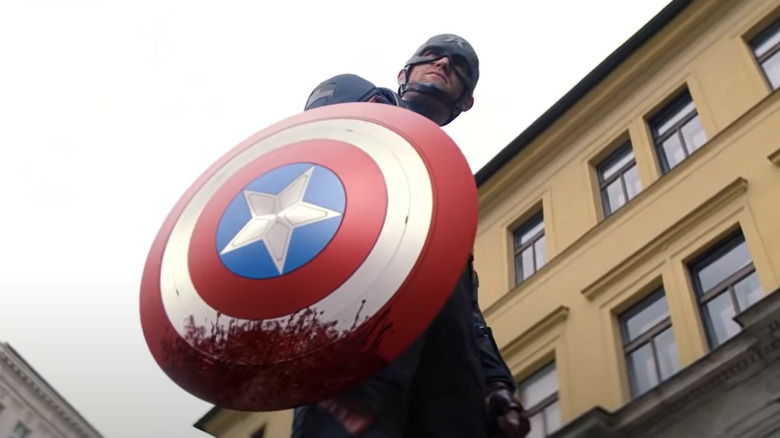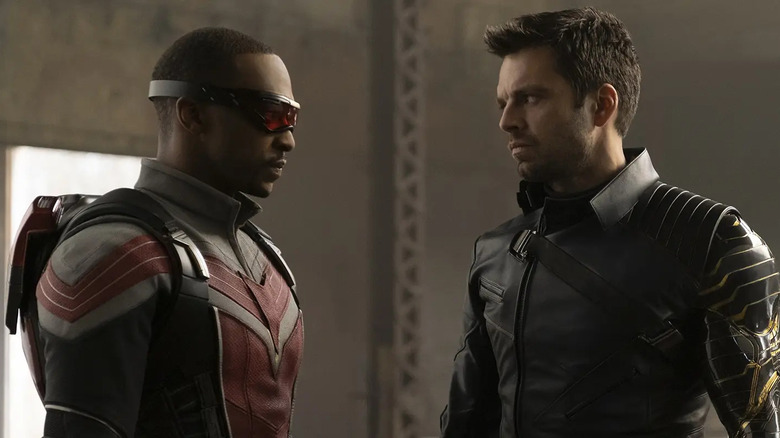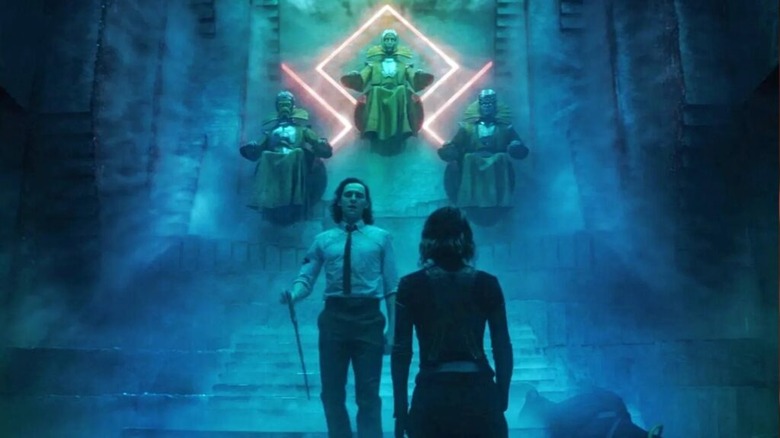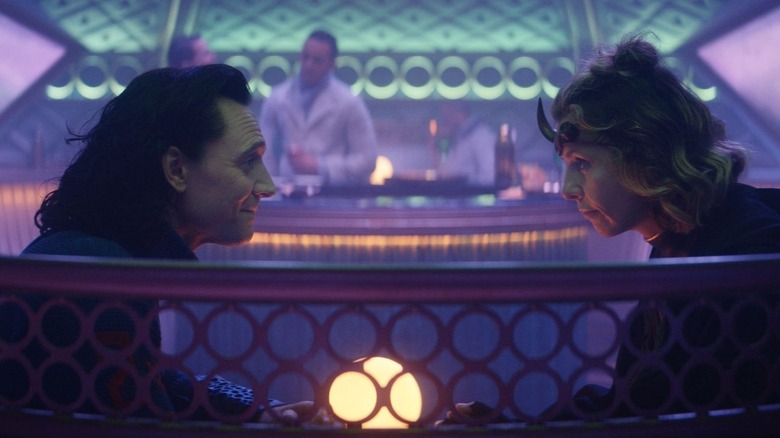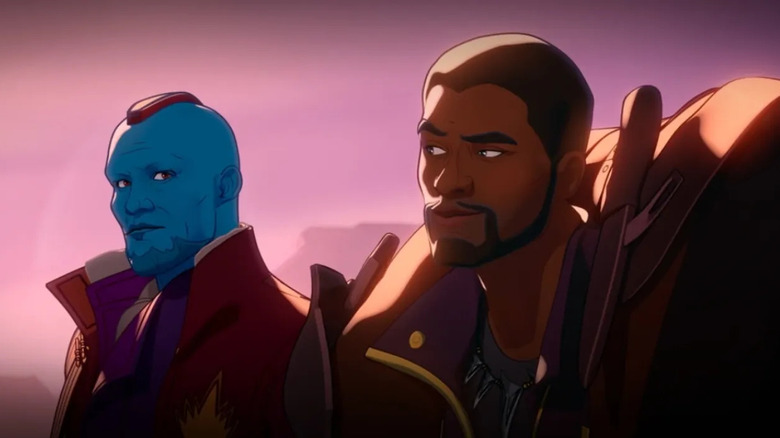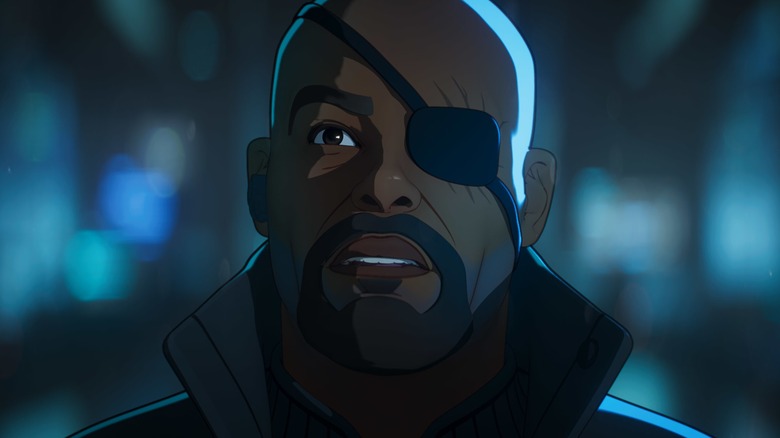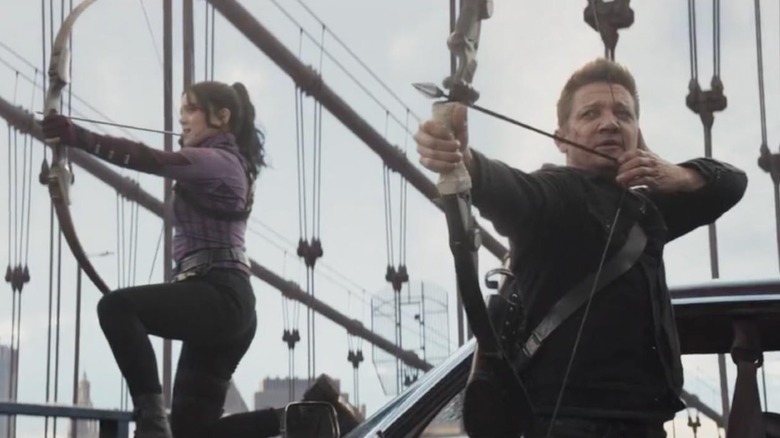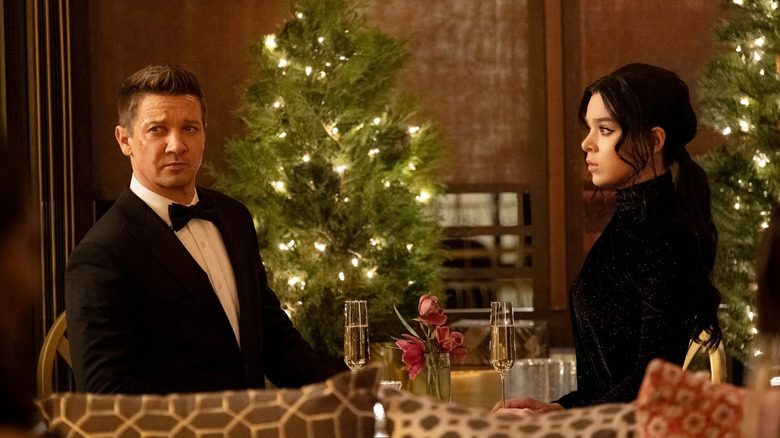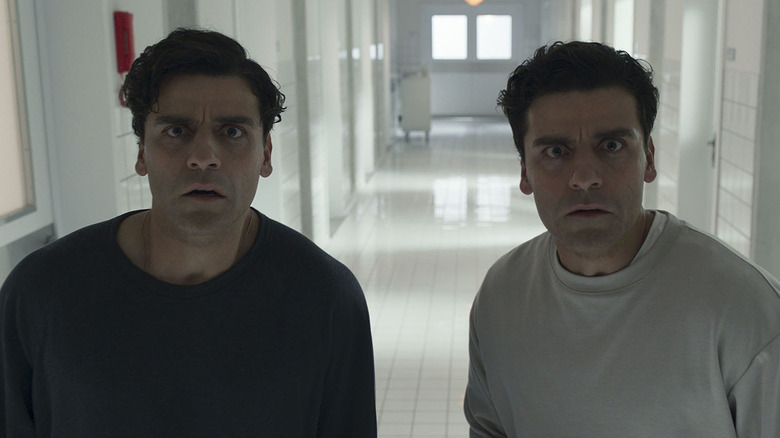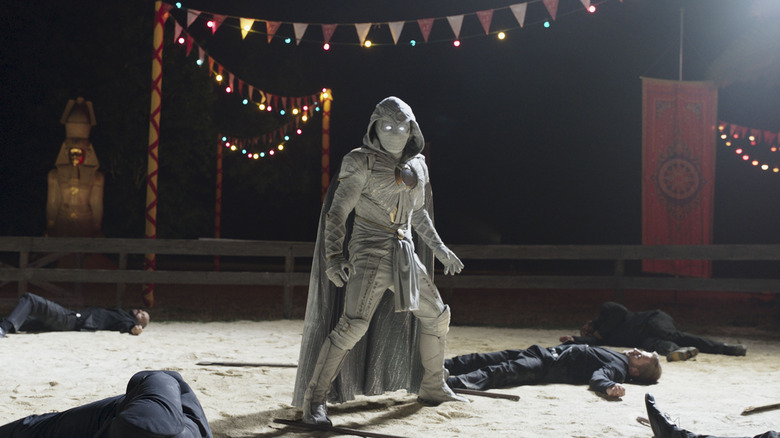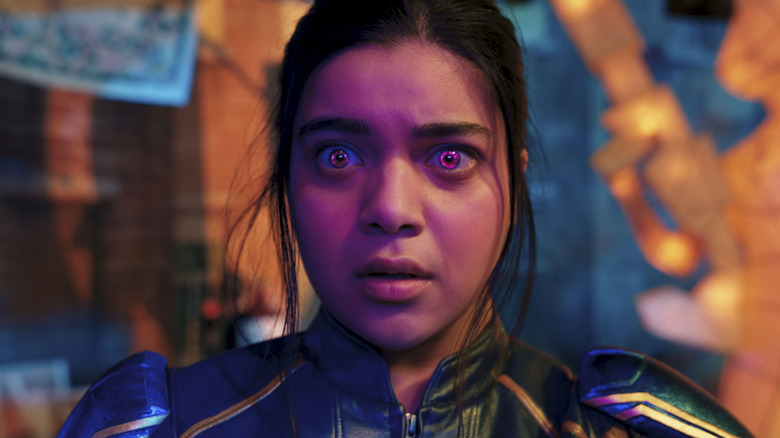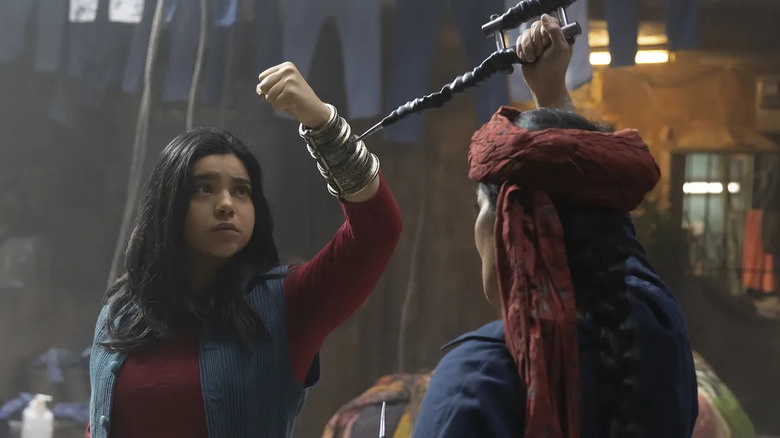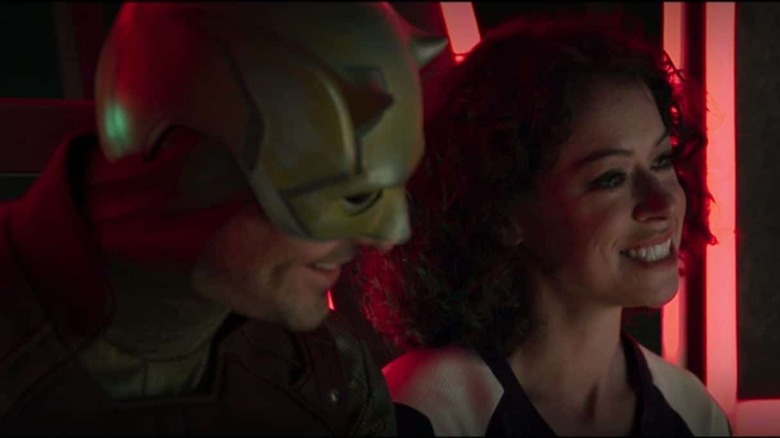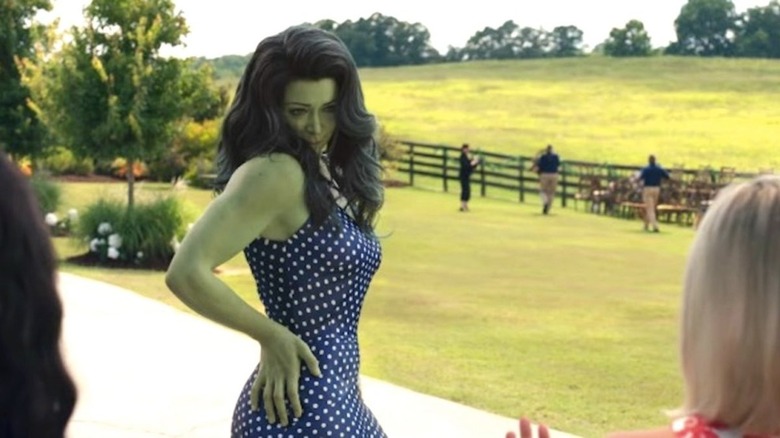Marvel's Disney+ Shows: The 8 Best And 8 Worst Episodes
When Marvel Studios first announced that it would be creating and producing multiple shows and miniseries exclusively for Disney+ that would tie into the overall Marvel Cinematic Universe (or MCU) and utilize many of its biggest stars and characters, it seemed like a daunting task. After all, previous attempts at making MCU tie-in shows under Marvel Television, such as "Agents of S.H.I.E.L.D.," were often lucky to have a one-episode cameo from supporting heroes such as Jaimie Alexander as Lady Sif. However, after the release of the incredible "WandaVision" in 2021, it became clear that Marvel Studios was serious about bringing its characters to life on the small screen.
With the release of the final episode of "She-Hulk: Attorney at Law" Season 1 airing on October 13, 2022, Marvel is taking a hiatus from releasing any new series until 2023. This makes it the perfect time to look back at all eight Marvel Disney+ series and determine which are the best and worst episodes of each one. Since this list will only be looking at the episodic shows, Disney+ specials like the recently released "Werewolf by Night" are not included.
Best: All-New Halloween Spooktacular! (WandaVision, Episode 6)
In "WandaVision," Wanda Maximoff and The Vision seem to be living in a different era of sitcoms in each of the early episodes. The sixth episode, "All-New Halloween Spooktacular!" not only pulls inspiration from various sitcoms of the late 1990s and early 2000s (with "Malcolm in the Middle" being the most prominent reference point), but it also draws inspiration from (and often lampoons) holiday-themed episodes. "Halloween Spooktacular!" takes place after the shocking finale of the previous episode, which reintroduces Wanda's brother Pietro. The character commonly referred to as Quicksilver is killed during the events of "Avengers: Age of Ultron," however, this iteration of Pietro is played by Evan Peters, who famously played Fox's version of Pietro in a handful of "X-Men" movies.
"All-New Halloween Spooktacular!" uses this opportunity to perfectly set up meta jokes around the recasting of supporting characters that sometimes happens in popular sitcoms, especially after a character's long absence. Evan Peters seamlessly jumps into role, which turns out to be more than meets the eye. The episode's Halloween theme also provides the perfect backdrop to insert clever Easter eggs such as Wanda and Vision's classic Marvel Comics costumes and Billy and Tommy Maximoff using their superhero outfits from Marvel Comics as their Halloween costumes.
Worst: The Series Finale (WandaVision, Episode 9)
The series finale of "WandaVision," aptly titled "The Series Finale," plays out in a similar fashion to many of its big-screen counterparts. The heroes fight the villain in an all-out battle. There's destruction, opposing monologues, and plenty of expensive CG effects. Normally this isn't a bad thing, but for a show as creative and unique as "WandaVision," it's a bit of a letdown to see the story devolve into another pretty generic Marvel climax, albeit a spectacular one.
Whereas "WandaVision" starts off spoofing traditional sitcom tropes and trends, "The Series Finale" serves as the trendsetter for all Disney+ Marvel shows going forward, for better or worse. While the "big battle" finales definitely have their place, they've come to overwhelm many of Marvel's shows that might have been better served with a quieter finale. Luckily, "The Series Finale" isn't all bad. The action scenes are well produced and exhilarating to watch, and most of the character arcs are given a satisfying conclusion ... at least until they're picked back up again in "Dr. Strange in the Multiverse of Madness."
Best: The Whole World is Watching (The Falcon and the Winter Soldier, Episode 4)
"The Whole World is Watching" is one of the tensest hours of television Marvel Studios has ever produced. Not only does the episode masterfully deal with the tight interplay between several fragile alliances, but it also features the impactful death of one of its supporting characters and ends with a scene that impacts the trajectory of the MCU going forward. The intrusion by the Dora Milaje, who wish to apprehend Zemo and bring him back to Wakanda to face justice for killing King T'Chaka, complicates matters for Sam and Bucky, who are trying to use Zemo to help stop the Flag Smashers. This leads to one of the series' best fights, as the Dora Milaje battle against John Walker, Lemar Hoskins, Sam WIlson, and Bucky Barnes.
However, things go downhill for our heroes from there. While Sam decides to try a diplomatic approach — attempting to talk down the Flag Smashers' leader, Karli Morgenthau — Walker and Hoskins get impatient and attack the Flag Smashers. Hoskins is killed in the ensuing battle, which enrages Walker and leads him to murder a member of the Flag Smashers in front a crowd who is livestreaming the incident. This tarnishes not only Walker's name, but the legacy of Captain America. The brutality of this act makes it one of Marvel's most horrifying moments, and the emotional impact resonates throughout the rest of the season.
Worst: New World Order (The Falcon and the Winter Soldier, Episode 1)
Unlike many of Marvel Studios' Disney+ shows which start really strong and fizzle out at the end, the worst episode of "The Falcon and the Winter Soldier" is arguably its first one. Much of the first episode is spent playing catch-up with the two titular heroes, showing what they've been up to separately since the events of "Avengers: Endgame" before finally bringing them together. The setup, while necessary, feels a bit slow at times.
That being said, "New World Order" is not a bad episode by any means. It speaks to the strength of "The Falcon and the Winter Soldier" that its lowest rated episode on IMDb still manages a 7.6 and delivers on multiple emotional character moments, even when the action isn't quite up to par. It is fun, however, to see the return of the nefarious Georges Batroc from "Captain America: The Winter Soldier" during the episode's opening action sequence.
Best: The Nexus Event (Loki, Episode 4)
"The Nexus Event" is the highest rated episode of "Loki" on IMDb with an impressive score of 9.0 and it's not hard to see why. The episode just about has it all: great character moments, surprise cameos, big reveals, and shocking moments. Picking up after "Lamentis," Sylvie and Loki return to the TVA. Loki gets locked in a repeating memory that sees Jaimie Alexander make a long-awaited return as Lady Sif. Mobius helps Loki escape, which leads to Mobius getting "pruned." Loki and Sylvie are then taken to see the Time-Keepers ... who turn out to be androids.
The episode is packed with impressive reveals and answers to many of the show's biggest questions while also introducing new questions that help set up the final two episodes. The scene with the Time-Keepers is amazingly tense. Seeing both Mobius and Loki get pruned before the episode ends is shocking, especially since the show up until now has insinuated that pruning amounts to death.
Worst: Lamentis (Loki, Episode 3)
In "Lamentis," Loki and Sylvie (a variant of Loki) get trapped on the moon Lamentis-1 in the year 2077. Unfortunately, they arrive just before a nexus event in which a planet collides with Lamentis-1 and destroys it. With their TemPad out of power, Loki and Sylvie are forced to make their way to an evacuation shuttle which has the ability to recharge the TemPad and allow them to escape. This becomes more challenging than it probably needed to be when Loki makes a commotion on a train and gets them kicked off.
"Lamentis" feels like a prolonged side-quest that doesn't really belong in the overarching narrative. While the episode does give Tom Hiddleston some good character moments as Loki, the drawn-out escape mostly feels like a slog. It doesn't help that the scenes on Lamentis-1 all use an ugly filter that throws off the show's unique color palette and sense of style.
Best: What If... T'Challa Became a Star-Lord? (What If...?, Episode 2)
Before his untimely death in 2020, Chadwick Boseman contributed his final performance for Marvel in the animated episode "What If... T'Challa Became a Star-Lord?" It's a virtually perfect story that honors the actor and his impact on the world. The episode's premise, as the title suggests, takes place in a universe where Yondu accidentally picks up T'Challa instead of Peter Quill. Like Quill, T'Challa becomes a Ravager and goes by the pseudonym Star-Lord. However, T'Challa's kind-hearted nature and expert leadership skills make him a far different Star-Lord than the goofy and self-aggrandizing Peter Quill.
The episode follows the adventures of T'Challa's Star-Lord who ends up meeting many of the same characters that Quill meets in the "Guardians of the Galaxy" films. Unlike Quill, many of those same characters have far more respect for T'Challa and his kind ways. This leads to him having better relationships with Yondu and his crew, and even convinces Thanos to side with him. Boseman's performance is magnetic, and the portrayal won him a Primetime Emmy Award for outstanding character voice-over performance.
Worst: What If... the World Lost Its Mightiest Heroes? (What If... ?, Episode 3)
One of the biggest challenges of "What If... ?" is that its format demands that the writers find a way to tell a new story starring several major heroes in just over a half hour. Most of the episodes succeed in this challenge, but there are a few that suffer from rushed storytelling, leading to plots that feel like jumbled, incoherent messes. "What If... the World Lost Its Mightiest Heroes?" is perhaps the worst offender. Its tale, which has the Avengers killed off one-by-one, never takes its time to establish the mystery behind these deaths and the ending is unearned and unsatisfying.
The killer is later revealed to be Yellowjacket, only the suit is worn by Hank Pym instead of Darren Cross. Pym, the original Ant-Man, commits the murders to get revenge on Nick Fury for recruiting his daughter Hope and getting her killed. All of this information is dumped at the end of the episode in a monologue with no build-up. In addition to the weak story, the episode has other issues. While much of the voice acting on "What If... ?" comes from MCU actors returning to their on-screen roles, this episode relies heavily on replacement actors. This isn't a problem in every respect — in particular, Lake Bell does a stellar Natasha Romanoff — but the overall use of replacements feels out of place in a show that primarily uses the original MCU actors.
Best: Echoes (Hawkeye, Episode 3)
While the first two episodes of "Hawkeye" focus on establishing the character of Kate Bishop — an up-and-coming expert archer who takes on the Hawkeye mantle in Marvel Comics — "Echoes" puts the focus back on Jeremy Renner's Clint Barton, one of the original Avengers in the MCU. The episode starts with Clint and Kate briefly captured by and promptly escaping from Maya "Echo" Lopez. During their escape, the two archers have to battle through the Tracksuit Mafia, leading to the show's best action sequence — a car chase involving some of Hawkeye's fun trick arrows.
While the episode really delivers on its action sequences, it also manages to land its calmer and quieter moments as well. After Clint and Kate's escape, they spend time bonding, and the show reveals that Hawkeye has been struggling with not only some form of PTSD, but hearing loss as well. "Echoes" probably does a better job developing Clint than any of the feature films he appears in, and Jeremy Renner and Hailee Steinfeld really shine in their performances. The scene where Kate tries to design Hawkeye a suit is a particularly wholesome and standout scene.
Worst: So This Is Christmas? (Hawkeye, Episode 6)
"So This Is Christmas?" is another of Marvel's finales that prioritizes big reveals and action scenes over satisfying story resolutions and character development. This is disappointing, as the episode introduces Vincent D'Onofrio's Kingpin officially into the MCU. D'Onofrio's portrayal of Kingpin became a fan favorite after his nuanced performance in the "Daredevil" series. Sadly, the character doesn't quite have the space to replicate the explosive menace D'Onofrio conjures on "Daredevil."
While Jack Duquesne is set up as a red herring, it turns out the show's main villains are Kingpin and Kate's mom Eleanor Bishop all along. Because the show tries to save the reveal until the last episode, Kingpin and Eleanor receive very little setup or motivation for their actions. Luckily, most of the action is good, and seeing Clint and Kate battle together in their new Hawkeye costumes is a lot of fun. In addition, Kate's comedic battle with Yelena Belova is one of the show's best scenes. While the villain plots ultimately fall flat, Kate and Clint's stories come to a satisfying conclusion, so the episode still succeeds more than it fails.
Best: Asylum (Moon Knight, Episode 5)
The penultimate episode of "Moon Knight" is a drastic change of pace for the show. While these kinds of episodes can often be a slog that slows the whole season's pacing, "Asylum" succeeds in just about every way that it can, elevating it beyond the already fantastic season of "Moon Knight." After his apparent death in the previous episode, Marc Spector and his other personality, Steven Grant, are trapped in the Duat — the Egyptian realm of the dead. There, they meet the Egyptian goddess Taweret. She forces the two to confront their pasts, including the traumatic event that led to Marc developing dissociative identity disorder.
"Asylum" is easily one of the best episodes of any Marvel series. It delivers on multiple, powerful emotional moments and pays off many of the show's important setups. Marc's tragic past, which includes blaming himself for his young brother's death and his emotionally abusive mother, helps contextualize much of the character's motivations. In addition, seeing Oscar Isaac portray both characters simultaneously, rather than switching between them, helps develop their powerful bond. This makes the ending scene where Steven Grant seemingly dies, and Marc's decision to sacrifice his eternal paradise to save him, all the more impactful.
Worst: The Friendly Type (Moon Knight, Episode 3)
There are no bad episodes of "Moon Knight," but "The Friendly Type" is the closest thing the season has to a throwaway episode. Much of the episode's plot revolves around Marc Spector and his wife Layla meeting with Anton Mogart, an antiques collector who owns a sarcophagus they need to complete their investigation. Unsurprisingly, Mogart betrays them, leading to some solid action scenes before the two manage to escape into the desert.
While actor Gaspard Ulliel does a fine job at making Mogart foreboding, the character just isn't written in an interesting way. His betrayal of Layla feels like a foregone conclusion from the get-go, and it takes far too long for the show to build into the ensuing battles. Thankfully, those fights are still a lot of fun to watch, and the final scene of the episode — which sees Khonshu changing the night sky — is visually astounding.
Best: Generation Why (Ms. Marvel, Episode 1)
"Generation Why" is the first episode of "Ms. Marvel" and the show gets off to an impressively strong start. Much of this is due to the charisma of Iman Vellani, who plays highschooler Kamala Khan. Kamala is an average teen who is a huge fan of superheroes, particularly Carol Danvers, aka Captain Marvel. As such, she is instantly relatable to Marvel fans. While Kamala doesn't receive her own superpowers until the end of the episode, "Generation Why" succeeds in introducing the main character and her family and friends.
This first episode leans heavily into some interesting design elements. Sketches on the screen help capture the mindset of the lead hero. These visual choices appear less frequently as the show goes on, which is a bummer for the rest of the series, but it helps the first episode stand out as a more unique representation of the character. As the official introduction to the MCU's first Pakistani American hero, the episode also does a fantastic job of paying tribute to the character's important heritage and background.
Worst: Time and Again (Ms. Marvel, Episode 5)
"Time and Again" is at once a fantastic, emotional episode and a pacing disaster in a show that is already far too short. The first two thirds of the episode take place in 1942 and feature Kamala's great-grandmother Aisha. Her story, which involves her taking refuge from the Djinn in a small village and falling in love, is powerful. However, the audience is abruptly pulled back into the present during the last few minutes, where a doorway to the Noor Dimension has been opened. Najma, the show's main antagonist, then sacrifices herself to close the door.
Not only does this bring the main antagonists' story to an abrupt end before the show's finale, but it also takes too much time away from the show's lead and the main cast as a whole. While an episode almost entirely focused on characters that don't appear in the rest of the show can work in a season with 10 or more episodes, a six-episode season means that the show already has very little time to develop its wonderful cast. While Aisha's story is well done, the show would have been better serviced building up its leads, or the show's main antagonist, who had far too little screentime.
Best: Ribbit and Rip It (She-Hulk: Attorney at Law, Episode 8)
"Ribbit and Rip It" made many "Daredevil" fans' dreams come true. Not only does it feature the long-awaited return of Charlie Cox as Matt Murdock, aka Daredevil, it brings in the character's classic red and gold costume for the first time in a live-action project. That being said, "Ribbit and Rip It" is a lot more than just a means to bring back Daredevil. In many ways, the episode epitomizes this show's best elements. The humor is spot-on, the plot surrounding an entitled and spoiled D-list superhero is as poignant as it is funny, and the action sequences are well designed and fun as heck.
While She-Hulk has many fun fights throughout the season — her battle with the Wrecking Crew in Episode 3, for instance — "Ribbit and Rip It" really puts the hero's incredible strength on full display. Not only does she get to scrap against Daredevil, but their team-up against Leap-Fog's men is really well choreographed. Tatiana Maslany really shines as Jen Walters in this episode. Her internal conflict about having to take a case against the man who makes her outfits is a stand-out, and her chemistry with Matt Murdock is so electric that it's hard not to want to see her play a significant role in the upcoming "Daredevil: Born Again."
Worst: Just Jen (She-Hulk: Attorney at Law, Episode 6)
While "Just Jen" is not as bad as its dubious IMDb score might have you believe, it's still an underwhelming half-hour that is easily the most forgettable story in the first season of "She-Hulk." The episode follows Jen as she's invited to be a bridesmaid at the wedding of a friend who she hasn't been close with in some time. Much to her dismay, her friend asks her to present as Jen and not She-Hulk, which becomes more complicated when Titania also shows up at the wedding.
As a less action-heavy episode, it stands to reason that "Just Jen" should work on a deeper character-building level. Unfortunately, the episode doesn't succeed at this, with too much time spent building a relationship between Jen and another guest named Josh (who is, shockingly, not what he appears to be). The episode has a golden opportunity to expand on Jameela Jamil's woefully underutilized Titania, but instead, it leaves her motivations as a one-dimensional revenge plot. Luckily, the show's humor is still intact, and Tatiana Maslany still makes Jen Walters easy to root for.
